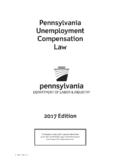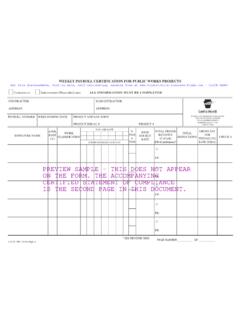Transcription of A Primer on the Pennsylvania Wage Payment and …
1 A Primer on the Pennsylvania wage Payment and collection Law By William James Rogers, Esquire Thomson, Rhodes & Cowie, Whether we love our job or hate it, we all work for wages. Most employees live from paycheck to paycheck, so even a brief interruption in income can have devastating consequences. The vast majority of employers pay their employees promptly and in full, but what recourse does an employee have when the employer refuses to pay the employee his or her due? The answer can be found in the Pennsylvania wage Payment and collection Law. 43 et seq. The Pennsylvania wage Payment and collection Law (WPCL) does not create a right to wages or benefits, but provides a statutory remedy where the employer breaches a contractual right to wages that have been earned.
2 Harding v. Duquesne Light Co., 882 422 ( Pa. 1995). The protections of the WPCL extend to all employees based in Pennsylvania . Killian v. McCulloch, 873 938 ( Pa. 1995), aff'd, 82 406 (3d Cir. 1996). The purpose of the WPCL is to remove some of the obstacles faced by employees in litigation and to make the employee whole for wages wrongfully withheld by the employer. Obeneder v. Link Computer Corp., 449 528, 674 720 (1996), aff'd, 548 Pa. 201, 696 148 (1997). The WPCL requires that wages and other fringe benefits be paid on regular paydays designated in advance by the employer.
3 43 Under , the employer has a duty to notify its employees at the time of hiring of the time and place, as well as the rate of Payment of wages, fringe benefits and wage supplements. The employer likewise must notify its employees of any changes with respect to these items. The employer may satisfy this obligation by posting these facts at the employer's place of business or including them in a collective bargaining agreement made available to employees. Wages become due and payable within the number of days after the expiration of the pay period as provided in a written contract of employment, within the standard time lapse customary in the trade or within 15 days of the end of the pay period.
4 Overtime wages are payable no later than the next succeeding pay period. Taken together, these provisions provide a range of dates within which an employer may designate the regular payday. Once designated, the employer's duty to pay wages on that day becomes fixed. Emgee Engineering Co. v. Unemployment Compensation Board of Review, 30. Pa. Comm. 290, 373 779 (1977). The employer may not change the designated pay date to suit its whims or cash flow. Under the WPCL, the term employer includes every person, firm, partnership, association, corporation, receiver or other officer of a court of this Commonwealth and any agent or officer of the above-mentioned classes employing any person in this Commonwealth.
5 The inclusion of agent or officer within the definition means that a corporate officer may be personally liable for the corporation's failure to pay wages. Faden v. DeVitry, 425 555, 625 1236. (1993), appeal denied, 535 Pa. 658, 634 221 (1993); Tener v. Hoag, 697 196 ( Pa. 1988). Corporate officers may also be personally liable for unpaid benefit contributions. Amalgamated Cotton Garment and Allied Industries Fund v. Dion, 341 12, 491 123 (1985). Personal liability of corporate officers rests on a finding that the officer had an active role in corporate decision making. Mohney v.
6 McClure, 390 338, 568 682. (1990), aff'd, 529 Pa. 430, 604 1021 (1992). Upon separation of employment, wages earned prior to separation become due and payable on the next regular payday on which such wages would otherwise be due and payable. If requested by the employee, Payment must be made by certified mail. 43 In the event of a dispute over the amount due, the employer must pay the undisputed amount without condition within the time limits specified. 43 The employer's obligation to pay the undisputed portion of any disputed wages cannot be overemphasized. The WPCL imposes liquidated damages for wages remaining unpaid for thirty days beyond the regularly scheduled payday or, where no regularly scheduled payday is applicable, 60 days beyond the agreement, award or other act making wages payable.
7 The amount of liquidated damages is 25% of the total wages due or $ , whichever is greater. Goodwin v. Visiting Nurse Ass'n. Home Health Services, 831 449 ( Pa. 1993), aff'd, 39 1173 (3d Cir. 1994). Liquidated damages may not be imposed in the case of a good faith contest or dispute of any wage claim, or good faith assertion of a right of setoff or counterclaim accounting for such nonpayment. 43 Thus, an employer may avoid liquidated damages by paying the undisputed portion of the wages where a dispute exists. Liquidated damages may also be imposed where shortages of wage payments exceed 5% of the gross wages payable on any two regularly scheduled pay days in a calendar quarter.
8 Therefore, it is important to maintain accurate information regarding wages and pay the correct amounts. Any employee, group of employees, labor or organization or party to whom any type of wages are payable may bring a civil action to recover the amount due. 43 (a). The Secretary of Labor and Industry also has the right to investigate and institute a civil action on behalf of aggrieved employees. 43 Under (c), an employee may, in effect, turn over a wage claim to the Secretary who, unless the claim appears frivolous, must immediately notify the employer of the claim by certified mail.
9 If the employer fails to pay the claim within ten days after receipt of the certified notice, a 10% penalty is imposed on the amount found to be justly due. Alternatively, or in addition, the Secretary is required, upon determining that the claim for wages is enforceable, to accept an assignment of the claim from the requesting party and thereafter may bring legal action to enforce the claim. 43 (e). One of the most effective weapons available to the Secretary of Labor is the ability to require the employer to post a bond as security for the amount of the wages claimed, less the amount of any good faith defense, setoff or counterclaim.
10 Failure to post the bond within thirty days of the request constitutes an admission of liability upon which execution may immediately ensue. 43. 260a(d). 2. In any civil action brought under the WPCL, attorney fees and costs are awarded to the successful plaintiff. 43 (f). The award of attorney fees is mandatory. Oberneder v. Link Computer Corp., 548 Pa. 201, 696 148 (1997). Unlike other fee-shifting statutes, which afford relief to the prevailing party, employers who successfully defend a WPCL claim are not entitled to attorney fees. The statute of limitations for a WPCL claim is three years from the date wages are due and payable.





